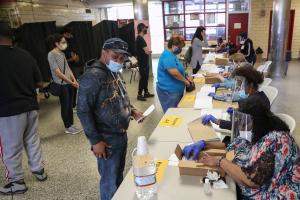Spotlight PA is an independent, non-partisan newsroom powered by The Philadelphia Inquirer in partnership with PennLive/The Patriot-News, TribLIVE/Pittsburgh Tribune-Review, and WITF Public Media. Sign up for our free weekly newsletter.
HARRISBURG — One day after President Donald Trump fanned manufactured fears of election fraud in Pennsylvania, Republicans in the state legislature pushed forward an effort to create an “election integrity” committee that Democrats characterized as a “stealth attack” on voting.
The resolution would create a committee of five House lawmakers — three Republicans and two Democrats — to investigate and review the Nov. 3 election. The group would be empowered to subpoena “witnesses and documents” and initiate legal filings.
Democratic lawmakers, outnumbered in both chambers, called the resolution an overreach of power with a high potential for abuse. The committee could even attempt to “impound uncounted ballots,” House Minority Leader Frank Dermody (D., Allegheny) claimed — potentially delaying the certification of Pennsylvania’s election results.
“To put it simply this is a dangerous threat to our democracy,” Dermody said in a statement.
Rep. Garth Everett (R., Lycoming), who introduced the resolution, dismissed those concerns, saying Wednesday the intent of the measure was to review the election and make recommendations for improvements.
“The only thing it has the power to do is … oversight and investigation,” Everett said. “It can’t make up rules, it can’t pass laws, it can’t do anything. Only [the legislature] can do that.”
He also said the committee could not subpoena ballots because the state constitution does not allow for measures that “violate the secrecy of the election process.”
Outside observers questioned that assertion. Bruce Ledewitz, professor of constitutional law at Duquesne University, said he wasn’t sure why Everett would use that section of the constitution to make such a claim.
“It may be true,” Ledewitz said. “I certainly hope so.”
Pat Christmas, policy director of the nonpartisan Committee of Seventy, said if ballots are subpoenaed after they are removed from envelopes it’s unclear if voter privacy would be violated.
“This seems to be yet another uncertainty as to how this committee would operate,” Christmas said.
House Majority Leader Kerry Benninghoff (R., Centre) said the resolution is a response to recent state Supreme Court rulings that have “injected chaos into the general election.”
Earlier this month, the court directed counties to accept ballots that arrive up to three days after Election Day, as long as they are postmarked on or before Nov. 3, and gave voters the option to use satellite drop boxes. GOP leaders have appealed the deadline extension to the U.S. Supreme Court.
Separately, a Trump campaign lawsuit aimed at prohibiting drop boxes and allowing partisan poll watchers to serve anywhere in the state is ongoing in federal court.
The House State Government Committee on Wednesday passed the resolution 15-10, along party lines, after an at times heated debate that saw Everett threaten to call security on Rep. Malcolm Kenyatta (D., Philadelphia). The measure cannot be vetoed by Democratic Gov. Tom Wolf, and only requires approval from a majority of House lawmakers.
The full House could vote as early as Thursday, a GOP spokesperson said.
As passed, the resolution does not make explicit when the work of the committee would begin, which concerned several Democrats. While Everett said the intent is for the review to take place “post-election,” the measure states that the committee’s work would be done in part to “improve the conduct of” the Nov. 3 election.
“The way it’s written now, I think my constituents would have grave and serious concerns that this somehow would be conducted in a manner that could interfere with that election,” Rep. Pam DeLissio (D., Philadelphia) said.
To address Democrats’ concerns and clarify the resolution, Everett said he may offer an amendment to the resolution when it reaches the House floor.
If Democrats and Republicans are “able to find a way for this resolution to move forward in a way that both sides agree to, that’s great,” said Christmas, of the Committee of Seventy. “But if they can’t, then this thing will produce more harm than good.”
He also stressed that counties for months have been begging lawmakers to pass legislation granting them more time before Election Day to begin processing mail-in and absentee ballots. Without such a change, officials say it may take days or even weeks to produce a final count.
That gap, Christmas said, could create a “very, very risky window where misinformation is going to envelop the entire state.”
House Republicans advanced a measure in early September that would allow the process to begin three days before the election.
That bill, Democrats said, was made in bad faith, as it would also ban satellite drop boxes and allow partisan poll watchers from across the state to volunteer in any county — a move that could be used to intimidate voters. Wolf has promised to veto the bill as written because he said it would suppress voters.
Rep. Kevin Boyle (D., Philadelphia), minority chair of the House State Government Committee, said negotiations between the GOP and Democrats have completely stopped.
“We believe increasingly that there is a broader plan to sow chaos,” he said. “And the best way for them to do it is to delay the tabulation and reporting of votes, most particularly in very Democratic urbanized areas where you have a lot of voters and then also a very high number of people voting by mail.”
While a spokesperson for the Senate GOP said “conversations are continuing to see if there is anywhere to go,” a spokesperson for House Republicans claimed “the governor refuses to work with us.”
Lyndsay Kensinger, a spokesperson for Wolf, countered that the governor and others in the administration “have spoken with leadership.”
100% ESSENTIAL: Spotlight PA relies on funding from foundations and readers like you who are committed to accountability journalism that gets results. If you value this reporting, please give a gift today at spotlightpa.org/donate.
